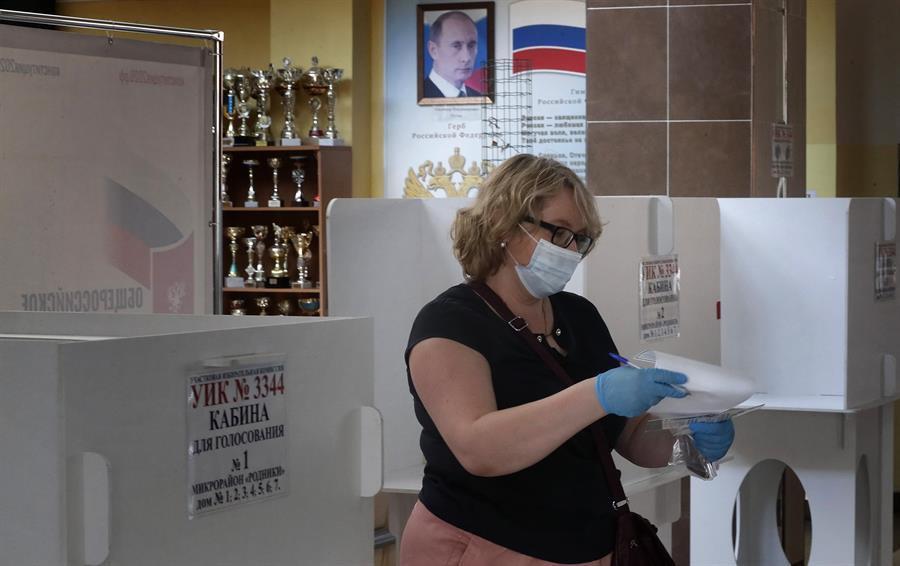
Russians began casting early ballots on June 25 in a nationwide vote on controversial constitutional reforms that could keep President Vladimir Putin remain in power until 2036.
Election officials opened polling stations in the lead-up to the official voting day on July 1 to reduce the risk of overcrowding that could spread the coronavirus infection.
Masks and disinfectant gels are being made available to 110 million eligible voters across 10 time zones. Voters sported masks and election officials distributed ballot papers wearing gloves.
The Kremlin reluctantly postponed the vote originally scheduled for April 22 as COVID-19 cases increased and officials imposed restrictions to slow the spread.
Putin- in power as president or prime minister since 1999- introduced the reforms to the 1993 constitution in January.
They were hastily adopted by both houses of parliament and regional lawmakers and the outcome of the vote is seen as a foregone conclusion.
Putin insisted that Russians vote on the changes even it is not legally required, arguing a plebiscite would give the amendments legitimacy.
Opposition campaigner Alexei Navalny has slammed the vote as a populist ploy designed to make Putin "president for life".
"It is a violation of the constitution, a coup," he has said.
Among other changes, the reforms would reset Putin’s presidential term-limit clock to zero, allowing him to run two more times and potentially stay in the Kremlin until 2036.
Under today’s rules, the 67-year-old’s current term in the Kremlin would expire in 2024.
Rallies scheduled in April in Moscow against the move were barred under virus restrictions against public gatherings.
The website of the "NO" campaign that collected signatures of Russians opposed to the reforms was blocked by a Moscow court in March.
Critics say the vote is even more vulnerable to fraud than regular polls because of a new system of online voting.
Footage posted on social networks showed voting in Russian provinces was organized out of car boots, on park benches or even tree stumps -- all quickly going viral to widespread ridicule.
Several Russian media reported on suspicious drives by state enterprises to force employees to vote, and some reporters said they were able to vote more than once through various organized schemes.
Sergey Panov, a 45-year-old in Russia’s second city, Saint Petersburg, said he drove to his polling station before work specially to vote against the reforms.
"This is the only thing I can do to keep my conscience clear and so I know that I did everything I could, even if it doesn’t affect the final result," he told AFP.
Other Russians backed the changes however.
One amendment guarantees the minimum wage will not be lower than the minimum subsistence level, another says the state pension will be adjusted annually to inflation.
"We have lots of problems and the amendments solve them in part. For me and my children and granddaughter they are good," said 62-year-old Moscow metro worker Vladimir Bodrov.
Senior political officials have stressed the importance of giving Putin a chance to remain in power.
Moscow Mayor Sergei Sobyanin said the reforms were necessary to "guarantee stability".
Putin said last week he had not decided whether to seek another term, but added that it was important that he have the option of running again.
"We must work and not look for successors," he said.
With the revised constitution already on sale in Moscow bookstores, the outcome is seen as a foregone conclusion.
Experts at state-run pollster VTsIOM this week projected that as many as 71 percent of voters would cast their ballots in favor.
Yet the vote comes as Putin is suffering historically low approval ratings over his handling of the coronavirus pandemic and the economy.
The independent polling group Levada published a survey last month that showed his ratings at an all-time low of 59 percent.
But on top of resetting Putin’s term limits, the reforms promise to enshrine conservative values that the Kremlin hopes will resonate with voters and attract a large turnout.
They include a mention of Russians’ "faith in God" despite a long history as a secular country, and a stipulation against gay marriage, which is not allowed under current legislation.
Ballot leaflets, posters, and billboards throughout Moscow do not mention Putin or lengthening the president’s term limits.
The campaign instead features scenes from family life, like a child kissing her grandmother with the slogan "for a guaranteed retirement".